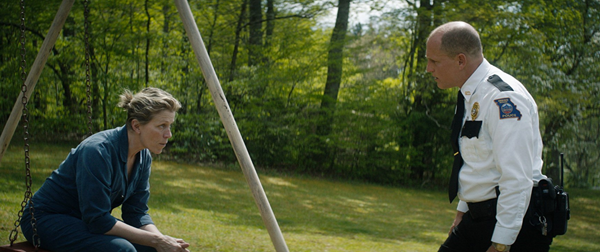
The writer and director of the cumbersomely titled Three Billboards Outside Ebbing, Missouri, Martin McDonagh, has directed just two other features, both of which can be summarily categorized as cult crime comedies (In Bruges and Seven Psychopaths). Three Billboards sees McDonagh shift focus from the mishaps of criminals to the rippling effects of a single crime, specifically on the colorful characters living in small-town Missouri.
The three billboards of the title are rented by Mildred Hayes (McDormand) to call out the Ebbing Police Department for not yet solving, and seemingly no longer trying to solve, her daughter’s murder. Despite the remoteness of these billboards, Mildred’s bold move stirs up a lot of controversy, affecting the life of the man she calls out by name, Chief Willoughby (Harrelson), then the hateful and ignorant Officer Dixon (Rockwell), and spreading throughout town to the dentist, the clergy, the local news and back around to those closest to Mildred. Though apparently Three Billboards takes place sometime during the dark age of flip phones and box televisions, the topical issues of institutionalized racism, bigotry and misogyny often bubble to the surface as if it were the dark age of Twitter and flat screens. Thankfully, however, the film refuses to devolve into being solely about the issues (2004’s Crash, anyone?).

While flirting with those macro themes, the film ultimately succeeds through a devotion to its characters and the strength of the actors portraying them. Frances McDormand is steadfast in her resolve, channeling Rosie the Riveter in what could be considered cosplay, and has more than a few empowering moments of shutting down her detractors through a charming combination of wit and vulgarity. The subject of her ire, Chief Willoughby, is given the good-guy treatment by Woody Harrelson, who lends the chief a relatable quality as a family man just trying to do what’s right. His foil is Officer Dixon, a poor drunk and comic book fan who lives with his mother, compensating for a lack of power in his life by exerting it on others. Nearly more caricature than character, Sam Rockwell deftly portrays Dixon as simultaneously repugnant and relatable. The far-reaching effects of the murder and Mildred’s billboards ultimately expose the grief, darkness and compassion in all three.

With small, yet fitting performances from John Hawkes and Peter Dinklage, Three Billboards is interesting and enjoyable, a film that toes the line between global and personal, between comedy and drama, softening their collision with a large, messy helping of humanity.













